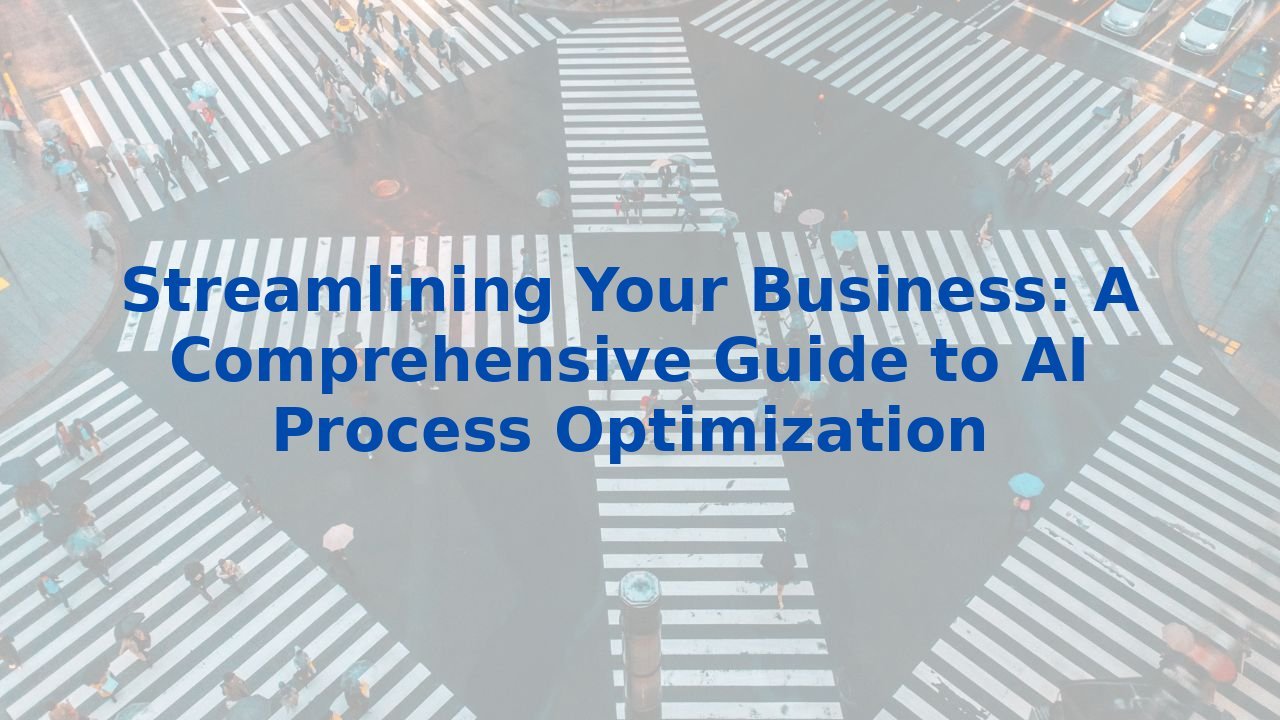Streamlining Your Business: A Comprehensive Guide to AI Process Optimization
Streamlining Your Business: A Comprehensive Guide to AI Process Optimization
Introduction
In an era where agility and efficiency are critical, businesses are continually seeking ways to elevate their operations. Enter artificial intelligence (AI), a potent ally in streamlining business processes. By leveraging AI, organizations can not only enhance operational efficiency but also make informed decisions at a rate previously deemed impossible. This guide will delve into how AI can optimize various business processes, showcasing the transformative benefits it offers across organizations.
What is AI Process Optimization?
AI process optimization represents a paradigm shift in business process management, utilizing AI and machine learning technologies to refine workflows. By incorporating data analysis, automating monotonous tasks, and supporting decision-making, AI aims to minimize errors and bolster productivity, ultimately paving the way for improved operational efficiency.
Enhancing Process Efficiency with AI
1. Automating Routine Tasks
One of the most straightforward implementations of AI is in automating repetitive tasks. For instance, intelligent document processing (IDP) takes on high-volume tasks like document processing, extracting and converting them into usable data automatically. This not only lightens the workload but also allows employees to channel their energies into more strategic initiatives that drive real organizational value.
2. Data Analysis and Visualization
AI-powered data analysis is crucial for understanding and optimizing business processes. Through process mining, AI analyzes data from various sources to reveal patterns and pinpoint inefficiencies. With AI-driven visualization capabilities, organizations gain immediate insights into process flows, enabling timely interventions to address emerging challenges or capitalize on opportunities.
3. Predictive Analytics
Predictive analytics represents a significant leap in decision-making capabilities. By providing simulations and extensive data-driven insights, AI allows companies to explore the ramifications of various actions, such as pricing adjustments. This kind of foresight is invaluable in striking the right balance between profitability and customer satisfaction.
4. Customer Service Optimization
AI's influence extends to customer service, where chatbots handle routine inquiries, freeing human representatives to tackle more complex concerns. AI's ability to analyze customer feedback further illuminates areas needing attention, promoting a more responsive and refined customer experience.
5. Supply Chain Management
AI's real-time data analysis capabilities can substantially enhance supply chain efficiency. By effectively identifying anomalies in purchase data, AI solutions alert teams about emerging issues, enabling quick responses. For instance, if a product surges in demand, an automated system can seamlessly trigger reorder actions, saving significant time and effort.
Benefits of AI in Business Process Management
1. Improved Decision-Making
The integration of AI into decision-making processes allows organizations to base their choices on comprehensive insights extracted from complex data sets. This not only accelerates the decision-making timeline but also significantly reduces the risk of errors.
2. Enhanced Productivity
By appropriating AI to manage mundane tasks, businesses witness a substantial uplift in productivity. Employees can invest their time and expertise in high-value activities, leading to a more purpose-driven workplace.
3. Real-Time Monitoring
AI-driven process monitoring shifts the paradigm from reactive to proactive management. Stakeholders receive real-time updates on process status, which empowers organizations to swiftly tackle issues and seize opportunities.
4. Risk Identification and Mitigation
AI serves as a vigilant guardian against potential risks, capable of recognizing deviations and anomalies within processes. By addressing these concerns promptly, businesses can circumvent inefficiencies and reduce error rates.
Training Employees for AI: The Key to Successful Implementation
The true power of AI emerges only when employees are well-equipped to interface with these technologies. Training is not merely an option; it’s a necessity. Here’s how effective training can transform your workforce:
1. Increased Efficiency
When employees understand how to effectively utilize AI tools, they execute their tasks more quickly and accurately, further magnifying overall organizational efficiency.
2. Improved Decision-Making
Trained staff are better positioned to interpret AI insights, leading to decisions that align closely with the organization’s strategic objectives.
3. Enhanced Collaboration
Fostering a culture that embraces AI training cultivates teamwork, enabling departments to synergize their efforts, leverage AI capabilities, and unlock greater organizational potential.
4. Adaptability
The landscape of AI technology is ever-evolving. A well-trained workforce can seamlessly adapt to new tools and methodologies, ensuring that the organization remains agile in a rapidly changing environment.
Conclusion
In conclusion, AI holds unparalleled potential to streamline business processes, driving efficiency, productivity, and informed decision-making. By integrating AI solutions and focusing on training employees to maximize these benefits, organizations can navigate the complexities of the modern business environment with confidence. By taking the leap and embracing AI technologies, your business stands to unlock newfound levels of efficacy, ultimately carving out a competitive edge for sustainable success.



